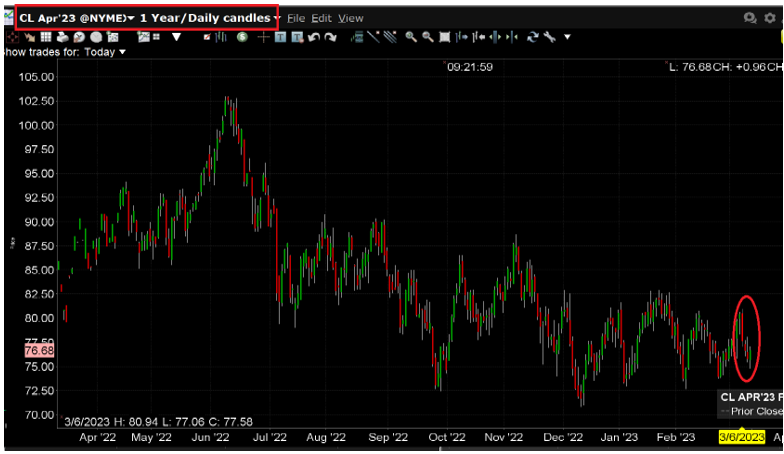Oil prices continue slump in fallout from Silicon Valley Bank shutdown,What's the Next?
In the past two weeks, some changes in the macro world have exerted a strong influence on the price changes of crude oil market. It is embodied in two things. First, the Federal Reserve issued a strong hawkish police; Second, Silicon Valley Bank (SVB) declared bankruptcy.
On March 6th, the Federal Reserve said that it underestimated the intractability of inflation, and the crude oil market turned around and fell, changing the upward direction of prices brought about by the hope of domestic economic recovery.
The next day, Silicon Valley Bank (SVB), the largest venture capital bank in the United States, experienced a run on the market, and the crude oil market continued to fall. On March 10th, the federal government took over Silicon Valley Bank, and the downward trend of crude oil price temporarily calmed down.

Personally, I think the reaction of crude oil price to the events in the macro world last week was really excessive. What is even more sad is that this nervous crude oil trading pattern may accompany us through 2023.
Is the crude oil trading pattern in 2023 neurotic?
Why do you say that? Because after WTI crude oil price touched an all-time high of US $130 in February last year, we were basically in an adjustment mode trading pattern where the price returned to normal.
The U.S. oil market is repeatedly testing the support line above $70, and also repeatedly testing the resistance line above $85. All kinds of macro-environmental changes are just the best excuses for market price changes.
That's why a month ago, we said that this year's crude oil market will be very difficult for traders who are good at trend trading.
Using crude oil option strategy to defeat the market
But this does not mean that we will have no way to defeat the market and make profits in the market in 2023. For this possible narrow-range shock market,The best futures option strategy may be to buy or sell Buy or Sell Strangles based on the implied volatility.
According to historical data, the average implied volatility of WTI flat options is 26%, that is to say, when the implied volatility is higher than 26%, don't buy it easily, and when the implied volatility is lower than 26%, don't sell it easily. At present, the implied volatility of US oil futures in December is 37.5%. For experienced option traders, the probability of winning the put option is relatively high.
CME group WTI crude oil (CL) and refined oil derivatives market is the largest crude oil derivatives market in the world, which mainly provides two major crude oil option products, the first is crude oil standard option, and the second is crude oil ultra-short-term option, that is, Weekly options.
What the above two options have in common is: one is American option, and the other is spot handover, which is settled into WTI crude oil futures contract. The difference between standard options and weekly options is that the expiration date of standard options is the first three days before the expiration date of corresponding futures, while the expiration date of weekly options is every Friday (LO 1-5).
So what are the benefits for weekly options? The biggest advantage is that the time is short, so the insurance premium price is relatively cheap. In other words, weekly options can effectively and flexibly manage the fluctuations and risks of short-term crude oil market without increasing insurance premiums.
$E-mini Nasdaq 100 - main 2306(NQmain)$ $E-mini Dow Jones - main 2306(YMmain)$ $E-mini S&P 500 - main 2306(ESmain)$ $Gold - main 2304(GCmain)$ $Light Crude Oil - main 2304(CLmain)$
Disclaimer: Investing carries risk. This is not financial advice. The above content should not be regarded as an offer, recommendation, or solicitation on acquiring or disposing of any financial products, any associated discussions, comments, or posts by author or other users should not be considered as such either. It is solely for general information purpose only, which does not consider your own investment objectives, financial situations or needs. TTM assumes no responsibility or warranty for the accuracy and completeness of the information, investors should do their own research and may seek professional advice before investing.

De$Spi Energy Co Ltd(SPI)$ @Gloria112 $Virgin Orbit Holdings Inc.(VORB)$ $ARCANE CRYPTO AB(ARCNF)$
$Victory Capital Holdings Inc.(VCTR)$ $Victory Capital Holdings Inc.(VCTR)$ $NVIDIA Corp(NVDA)$
$Virgin Orbit Holdings Inc.(VORB)$ $SEED INNOVATIONS LTD.(FFRIF)$ $NVIDIA Corp(NVDA)$
Great ariticle, would you like to share it?
Great ariticle, would you like to share it?